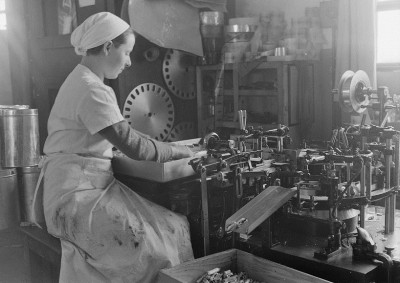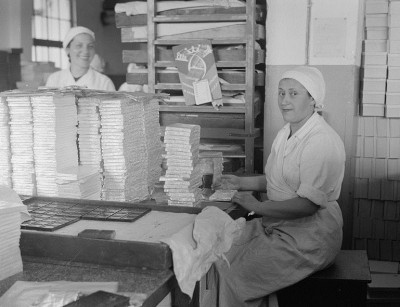Parenting Lessons from Charlie and the Chocolate Factory – Part 1
Several weeks ago we had a four-generation outing to the play, Willie Wonka at the Cumberland County Playhouse in nearby Crossville, Tennessee. Our party included my mama, our daughter and her husband, their two- and four-year-old children, our son-in-law’s parents, and Ray and me.
I love going to the Playhouse for many reasons and all of those reasons are related to my family. My first visit was to see Tennessee, USA, with my mama, daddy, and little brother in the 1960s, at the urging of my aunt and uncle who lived down the road. It was one of the first if not the very first play performed at the then brand-new community-built theater.
After Ray and I moved our family to this area in 1993, I became the play organizer for our homeschool group. Our children and I spent many wonderful hours, making the beautiful drive to the top of the Cumberland Plateau and seeing plays as diverse as Fiddler on the Roof and Good Neighbors, an original musical about Cordell Hull, a local hero and former Secretary of State under President Franklin Roosevelt. Cordell Hull is so local that I browse for antiques under his old law office in Gainesboro and we live in the house once owned by his law partner, Judge John Gore.
I digress, but you are used to that. Back to Willy Wonka . . .


Seeing Willy Wonka reminded me of how much Mary Evelyn had enjoyed reading Charlie and the Chocolate Factory, on which the play and the movie are based. After waiting many weeks for it to be available through the Tennessee library system’s audio download system, I finished it last week. Mary Evelyn was right. It was a delight.
Charlie and the Chocolate Factory is now on my list of must-reads for parents. It is a super-fun, fantastical book for children and a great read aloud. In fact, I think that parents reading Charlie to their children is one of the very best parenting ideas I can think of because, while both parents and children are having a rip-roaring time, they learn powerful lessons, useful for keeping both parents and children accountable.
Charlie’s family is very poor. They live in a tiny two-room house that is extremely cold in the winter. Though tiny, cold, and quite bare, it isn’t too tiny to hold seven people — Charlie, his parents, and both sets of grandparents. That’s because they love one another.
The first lesson I noticed in Charlie and the Chocolate Factory concerned the relationship between these seven people. Charlie and his parents sleep on the floor in one room, while the four grandparents sleep together in the only bed which is in the other room. I told you it was fantastical, but the fantasy just adds to the fun and makes the lessons even more palatable.
Charlie’s grandparents, who are all in their nineties, sleep pretty much all the time except for a half hour each evening when Charlie comes in for his nightly visit. During that half hour the grandparents tell him stories. Often his parents stand in the doorway to listen, too.
Before we had grandchildren, other grandparents tried to tell us how stupendously wonderful it was to have grandchildren. It wasn’t until I had them myself that I completely understood. Even though Roald Dahl was not yet a grandparent when he wrote Charlie and the Chocolate Factory, he got it. His narrative about these thirty-minute events every evening are perhaps the best description I have ever heard of what grandchildren mean to grandparents.
I felt very good about my own relationship with my parents while our children were growing up. I was purposeful. We had great times together and we have many wonderful memories. However, now that I am a Little myself, I grieve over the fact that I did not make sure we spent lots more time together.
Ray and I read about parenting. We listened to speakers talk about parenting. We were immersed in teaching about the importance of the nuclear family. I do not remember ever hearing about the importance of grandparents in the lives of children — not one time. That astounds me as I think back on it. We read the passages about children honoring their parents, but we thought that was about children honoring their parents while they were growing up. Ray and I honored our parents, but I wish that honor had had the depth back then that I have come to believe is essential now.
Our visits to see our parents and my own grandparents (and our children’s grandparents and great-grandparents) did not happen because someone was teaching us to do that. We cherished every opportunity for our parents to visit us or for us to visit them because we loved our parents so much. As I said, I regret that we didn’t do that more — much more.
It takes effort to forge and preserve multi-generational relationships. All these relationships involve folks and we folks are all complicated, aren’t we? It is worth the effort.
I share this with you today because I wish so much someone had shared it with me.
Indeed, may you see your children’s children.
Peace be upon Israel!
Psalm 128:6
Disclaimer: I want to be careful not to lead anyone away from the straight and narrow, as God defines the straight and narrow, so I feel compelled to tell you that the only thing I knew about Roald Dahl before writing this post was that he wrote Charlie and the Chocolate Factory. I haven’t read any of his other books, so I can’t recommend any others. However, I recommend Charlie wholeheartedly, except for one word used one time, so I do recommend reading it aloud with an edit in that one spot.


As they say on the radio waves, “longtime listener(blog reader), first time caller(commenter)”
I just finished reading the Giver. In chapter 16, the Giver gives Jonas the memory of Grandparents (the parents-of-the-parents). Jonas realizes that his parents must of had parents but that he knows nothing about them. If they are still contributing to the community then they live with the other Childless Adults, or they are in the House of the Old, or else they have been “released”. Jonas tries to reason as to how the current way of doing things is better in many ways but he finally comments that the family in the Giver’s memory seemed more complete and he discovered the feeling of love which was new to him.
Thank you for your daily encouragements. I read every single one of them.
Thank you for reading and for this your first comment, Blessed Mommy. It has brightened my evening. I must read The Giver again. I don’t remember that part about grandparents at all. I think of The Giver as an important book (best read aloud so that parents can be with their children as they confront the many important issues and best read when children are old enough to hear about the issues) because it illustrates so well the need to know history and the terrible things that can happen if we don’t. Now, thanks to you, I know another reason!
Thank you for this encouraging post! I hadn’t really thought about it but you’re right we don’t emphasize grandparents enough! I to have some regrets over not making enough opportunities for my children to spend time with their grandparents. This encourages me to do more with those we still have with us. As I am now a grandparent, long distance, I am working at keeping connected across the miles. One thing my daughter has started doing is having the grands ‘write’ to us and she records several days of these short notes and sends in one envelope. Little things add up. Would love to hear more on this topic.
Your daughter’s idea is a great one.